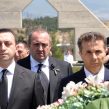
The Conflict Between the President and the Prime Minister Continues to Dominate the Georgian Political Landscape
Publication: Eurasia Daily Monitor Volume: 12 Issue: 15
By:

Since the start of this year, Georgian political life has been increasingly dominated by the deepening and all-consuming conflict between President Giorgi Margvelashvili and Prime Minister Irakli Garibashvili. This time, the cause of contention between the two men became the question of whether the government would and should attend the president’s upcoming State of the Nation annual address. Last year, government ministers deliberately abstained from attending President Margvelashvili’s State of the Nation address in the parliament. But on January 13, 2015, Margvelashvili expressed hope that this year, the government members would not snub his address again and, thus, not damage the country’s image abroad and the government’s reputation domestically (Rustavi 2, January 13).
Always ready to take on President Margvelashvili, Prime Minister Garibashvili quickly fired back, stating that, according to the Georgian constitution, the prime minister, the government, and cabinet members are not obliged to attend the president annual’s address. He said, the head of state’s address is symbolic in nature, and nobody should credit this speech with any great importance (Channel 1, January 14).
The fact that such a seemingly trivial question as the attendance of the government at the president’s annual address became a cause of another showdown between the two men, demonstrates the pair’s political irresponsibility. Even more so, it illustrates the depth of animosity between them.
However, this animosity is not entirely their fault: it stems, at least in part, from the Georgian constitution. The current constitution is proving to be one of the most negative legacies of former president Mikhail Saakashvili’s administration. By awkwardly splitting the executive power between the president and the prime minister, the 2009 constitution created fertile ground for constant bickering between the head of state and the head of the government (Parliament.ge, accessed January 23). However, blame also lies with President Margvelashvili and Prime Minister Garibashvili for utterly failing to find common ground in order to avoid embarrassing, self-damaging, and politically destabilizing (for the country) conflicts.
Such conflicts will apparently most likely continue almost on a daily basis, as the president tries to strengthen his position while the prime minister acts to push back. For instance, on January 13, President Margvelashvili appointed Kakha Kozhoridze, a critic of the current government and a former head of the Tbilisi-based human rights and legal advocacy group Georgia’s Young Lawyers’ Association (GYLA), as his advisor for justice and human rights issues. Margvelashvili specifically emphasized that the appointment of such a “highly qualified” professional as Kozhoridze would make the president’s administration “stronger” (Civil Georgia, January 13). Margvelashvili’s remarks about building a “stronger” presidency were likely little more than empty rhetoric, however, since strengthening his position would require a change in the constitution. But without strong support from a majority in parliament, constitutional tinkering is currently beyond Margvelashvili’s abilities.
Nevertheless that might change if Margvelashvili establishes his own political party and competes in the 2016 parliamentary elections. In fact, that is exactly what Margvelashvili might do, according to some political experts in Georgia (Maestro TV, Channel 1, December 20, 2014–January 10, 2015). Considering the fact that Garibashvili’s government is facing growing popular disappointment over its exaggerated and unrealistic electoral promises (see EDM, July 30, 2014; October 14, 2014; December 10, 2014), Georgian voters may welcome the arrival of a fresh political force.
Meanwhile, another potential conflict is brewing between the president and the government. The ten-year term of the current Chairperson of the Supreme Court (Konstantin Kublashvili) expires in late February 2015, and the president has the constitutional power to nominate his successor. The proposed chairperson’s confirmation, however, requires the support of the majority of the parliament—76 votes. Needless to say, the Georgian Dream (GD)–dominated parliament and the GD government will likely do everything in their power to block the president’s nominee. In advance, President Margvelashvili struck a tone of compromise, offering consultations and negotiations to all stakeholders in the parliamentary majority and civil society to come up with an acceptable candidate for all sides (Channel 1, Rustavi 2, January 13). But so far, the government has not responded to his conciliatory gesture. Most likely, therefore, Georgia can expect a new phase in the showdown between the president on one side, and the prime minister, the cabinet and the parliament on the other.
Overall, the ongoing hostility between President Margvelashvili and Prime Minister Garibashvili continues to dominate the Georgian political landscape. And this state of affairs raises the question as to how well Georgia’s government will be able to handle the country’s multiple problems and challenges. The complicated and detailed implementation of the Association Agreement and visa liberalization rules with the European Union represent just one example of the challenges and serious tasks that the fractured Georgian leadership has to undertake this year. Whether the government will show unity in the face of such challenges remains to be seen. So far, however, the signs are not particularly encouraging.




